Six-Week Get Back To Fitness Plan
Get off the couch and into the gym with this six-week schedule
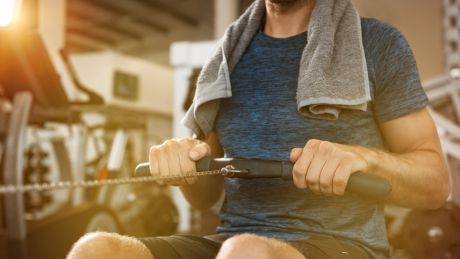
If you’ve made the decision to improve your fitness after a period of inactivity we’ve got some good news for you – you should take it easy (at first). The temptation is to smash out your first one or two workouts while your motivation is at its peak, but it’s absolutely crucial that you don’t go too hard too soon. If you do, it’s likely you’ll leave your body suffering DOMS (delayed onset muscle soreness) from the physical stress it’s unaccustomed to and your enthusiasm for exercise in tatters.
“An all-guns-blazing approach is more than likely to end your programme before it starts,” says Richard Scrivener, product development manager, and health and performance coach at TrainFitness. “You’ll be reminded that your fitness isn’t where you think it is, and you’ll have to wait as much as a week before the soreness subsides and you can train productively again.”
We’re not saying that starting slowly will save you from experiencing pain completely, but at least it won’t be so intense that you can’t contemplate any exercise for days. The right approach to getting back into shape is all about making sure your body can handle the work you’re doing. This might mean your improvement is a little more gradual than you’d hoped for at first, but it’s better to progress slowly and steadily over a long period than start at a furious pace and burn out quickly. (There’s a decent fable in that, we reckon.)
“You need to ensure your body is equipped for any workout you throw at it, and allow time to progress,” says Scrivener.
“Use what is known as progressive overload. So even if you can lift that extra 10kg, it’s better to split it into two 5kg increments and add these over two training sessions. This way, improvement is bite-sized and continuous, and it represents an appropriate amount of stress per workout.”
This six-week training plan from Scrivener is designed to put those principles into practice, so follow it to ensure you don’t overload yourself early on. Stick to the plan for the full six weeks and you’ll find that you improve in these four important areas.
1. Movement Control And Awareness
A crucial aspect of every workout is ensuring that you are performing the exercises correctly, which takes a little learning.
Get the Coach Newsletter
Sign up for workout ideas, training advice, reviews of the latest gear and more.
“Performing exercises with good technique – which includes effective timing, tempo and range of movement – means that it will be far easier to build muscle, strength and power in the following months,” says Scrivener.
2. Joint Mobility
“Another way to look at mobility is to view it as having access to an exercise,” says Scrivener.
“For example, if you cannot flex at the hips and sit deep enough into a squat, then you’ll never be able to tap into the full potential of that exercise.”
3. Joint Stability
Knowing the technique for an exercise is one thing, but having the ability to do it correctly requires stability in your joints, especially if you want to avoid injuries.
Follow the instructions carefully and ensure your body is in the right position to perform the moves, especially your back. If your body's not aligned as the move requires, you increase your risk of injury.
4. Aerobic Conditioning
Whatever your long-term fitness targets are, you will require stamina to achieve them, so building this in to the first weeks of a training plan is vital.
“All fitness goals depend on steadily being able to do more over time,” says Scrivener.
“Even strength and power development depend on the ability to recover quickly between sets and build volume.”
Who Is This Fitness Plan For?
This is a plan that everyone can use. Don’t worry if the names of some exercises look unnecessarily complicated (we’re looking at you, quadruped T-spine rotation). Once you read the descriptions, you’ll quickly find that even if something sounds complicated, it’s a relatively simple movement to get a handle on after a few tries. It’s a good idea to sit down with this plan in your own home and familiarise yourself with the exercises so you can step into the gym with confidence.
The plan is carefully designed to avoid any one workout knocking you out completely, meaning you can build your fitness slowly but surely over the six-week period. While your body will feel like it’s put in some serious work after the first session, it won’t be so sore that you have to cancel all your plans for the next few days while you recover.
In addition, the plan is great for beginners because it teaches you a lot about the way your body should move when performing the exercises. Form is key to long-term success in the gym, and your focus should always be on learning the correct way to do each exercise, rather than knocking out as many reps as possible no matter how sloppy your technique gets.
To put it another way, this plan is for anyone looking to get back into fitness for the long term, rather than just forcing themselves through a brutal short-term plan that will turn you against the gym for the rest of your life. The next six weeks are just the start.
Six-Week Beginner Fitness Plan
This six week plan from Scrivener involves four workouts a week – two focused on aerobic conditioning and two on resistance training. Each week you will tackle the same four workouts, but with additional reps or sets to make them more challenging as you become fitter. Even if you’re feeling great and want to do more on a particular day, stick to the guidelines to ensure you don’t put yourself out of the commission for the rest of the week.
Don’t worry if you haven’t heard of some of the exercises before, there are instructions for each and the workouts are aimed at people looking to get fit from near-enough scratch.
Do the workouts in the following pattern each week:
Monday – Resistance Training 1
Tuesday – Aerobic Conditioning 1
Wednesday – Rest
Thursday – Resistance Training 2
Friday – Rest
Saturday – Aerobic Conditioning 2
Sunday – Rest
Monday – Resistance Training 1
Before you start the workout, foam roll your calves, hip flexors and lats for 30sec each, to a maximum discomfort level of around 7/10.
1 Clock squat
Sets 1 Reps 3 on each leg
Stand on one leg and move the non-standing leg out in front of you, but don’t ground it. Squat on one leg, then move your non-standing leg out to the side, and squat again. Move your non-standing leg behind you, squat again, then – and this is the tricky one – take your non-standing leg behind your other leg to the opposite side for one last squat. That’s one rep.
Progression: Add one rep each week until you reach five reps, then add an extra set in the sixth week.
2 Lunge
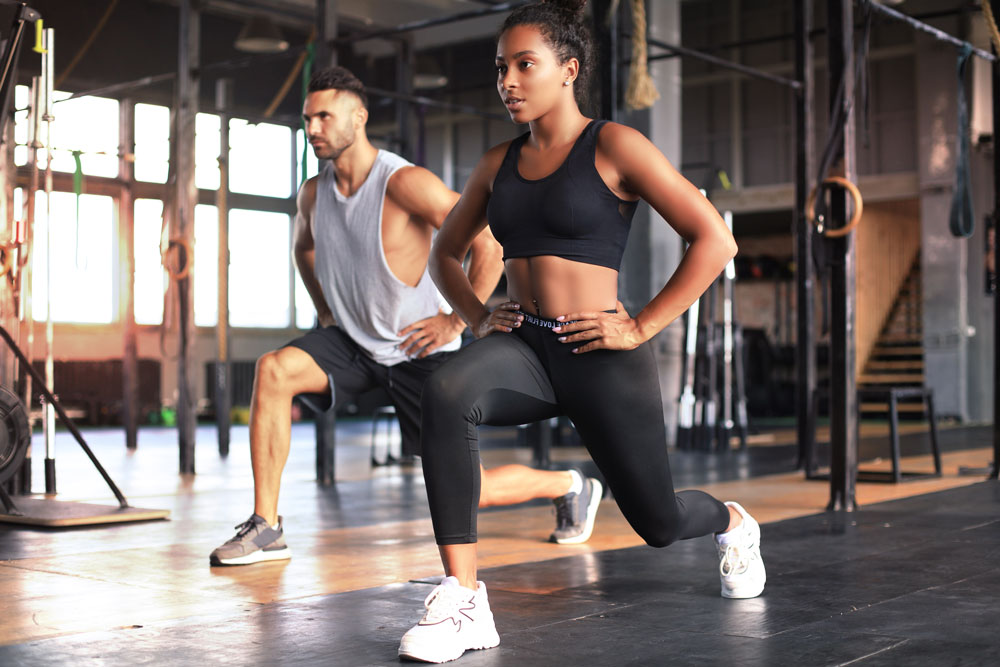
Sets 2 Reps 12 each leg Rest 30sec
Standing with your feet together, step forward and lower until both your knees are bent at 90°. Push through your heels to return to the starting position.
Progression: Add two reps each week until you reach 20 reps.
3 Quadruped T-spine rotation
Sets 2 Reps 12 each arm Rest 30sec
Get on your hands and knees (the “box position”) and place one hand behind your head. Rotate your torso to drop the raised elbow towards the opposite hand, and then rotate in the opposite direction to take the elbow up towards the ceiling. Your eyes should always be looking at the point of your elbow. Do all the reps on one arm, then switch.
Progression: Add two reps each week until you reach 20 reps.
4 Plank with straight-arm press-up
Sets 2 Reps 12 Rest 30sec
Adopt a press-up position with your hands directly under your shoulders. Tense your glutes and abs and press hard into the floor to spread your shoulder blades apart. Keeping your elbows straight, drop your chest towards the ground so that your shoulder blades come together. Then press back up. Don’t bend your arms – it’s not a full press up.
Progression: Add two reps each week until you reach 20 reps.
5 Resistance band lateral walking squat
Sets 2 Reps 12 each side Rest 30sec
Loop a resistance band around your ankles and move your feet apart so there is some tension in the band. Then take a step to one side and squat. Keep moving until you hit the number of reps on that side, then go back in the opposite direction.
Progression: Add two reps each week until you reach 20 reps.
6 Pull-up
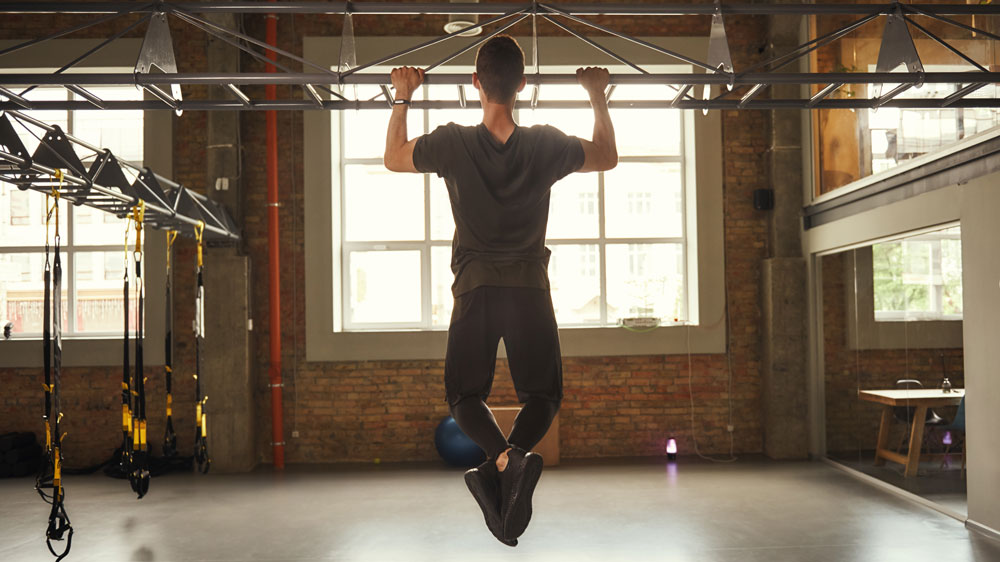
Sets 2 Reps 12 Rest 30sec
Grasp the bar with an overhand grip and drop until your arms are fully extended, then pull back up until your chin is over the bar. If you can’t hit 12 reps, and it’s a pretty big ask, then use an assisted pull-up machine or do fewer reps.
Progression: Add two reps each week until you reach 20 reps.
7 One-arm one-leg deadlift
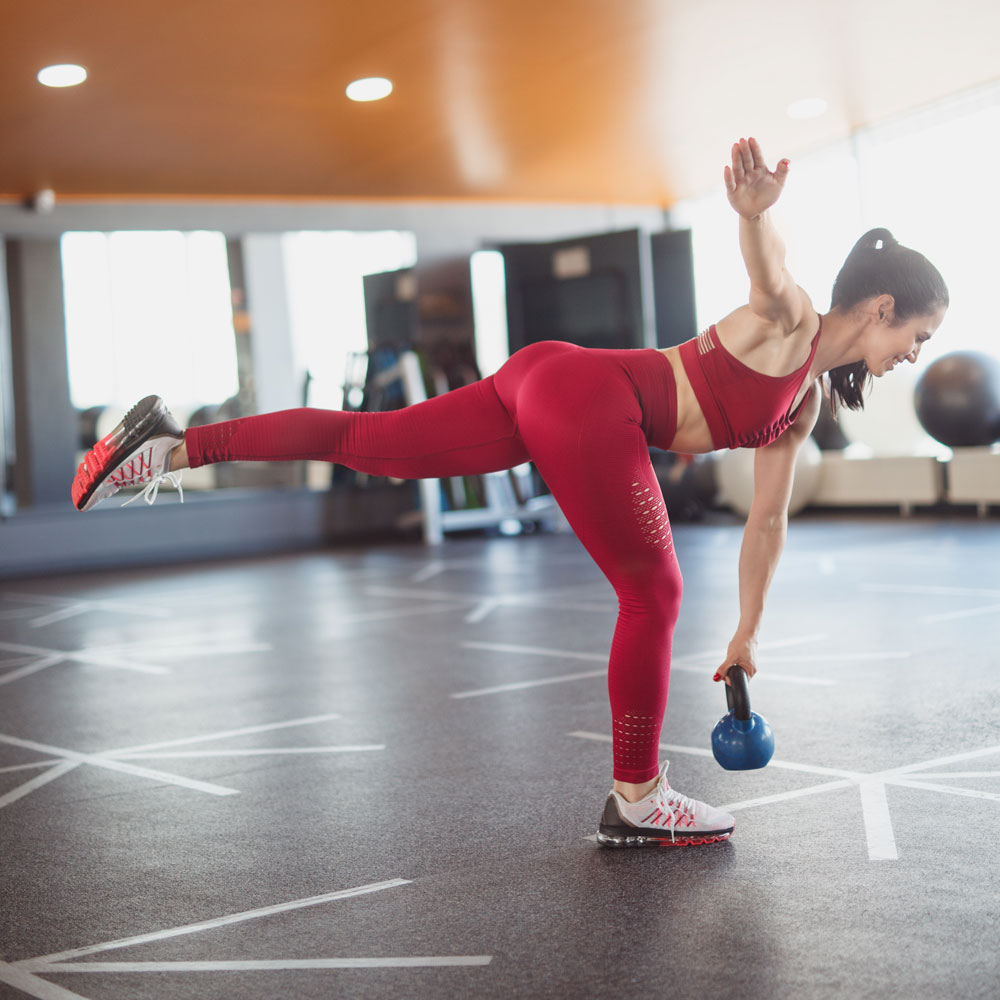
Sets 2 Reps 12 each side Rest 30sec
Select a kettlebell that’s heavy enough to challenge you but not so heavy that it distorts your posture during the exercise. Grasp it in your right hand and lift your left leg just off the floor. Bending at the hips, lower your torso towards the floor. Raise your left leg behind you as you lower the kettlebell straight towards the floor. Then return to the starting position. Do all your reps one one side, then switch to the other arm and leg.
Progression: Add two reps each week until you reach 20 reps.
8 Face-down wall angel
Sets 2 Reps 12 Rest 30sec
Lie on the ground face down with your chin tucked in. Bring your arms up into the “surrender” position (hands past your head, with your elbows bent at 90°) and hold them just above the ground. Slowly extend your arms forwards until they are straight and then bring them back to the surrender position, keeping them just off the ground, without changing your body position.
Progression: Add two reps each week until you reach 20 reps.
9 Plank with alternating step-in
Sets 2 Reps 12 each leg Rest 30sec
Adopt a press-up position with your hands directly under your shoulders. Bring one foot forwards so it’s next to the hand on the same side, and then raise your chest and look forwards. Lower your chest, return your foot to the starting position and then step forward on the other side. Alternate legs until all reps are done.
Progression: Add two reps each week until you reach 20 reps.
10 Dead bug
Sets 2 Reps 12 each side Rest 30sec
Lie on your back and raise your legs, bending your knees to form a 90° angle, and raise your arms so they’re pointing at the ceiling. Slowly lower your right arm and left leg until they are just off the floor, then bring them back to the starting position. Then repeat that movement with the opposite arm and leg. Alternate which limbs you lower until you complete all the reps.
Progression: Add two reps each week until you reach 20 reps.
See related
Tuesday – Aerobic Conditioning 1
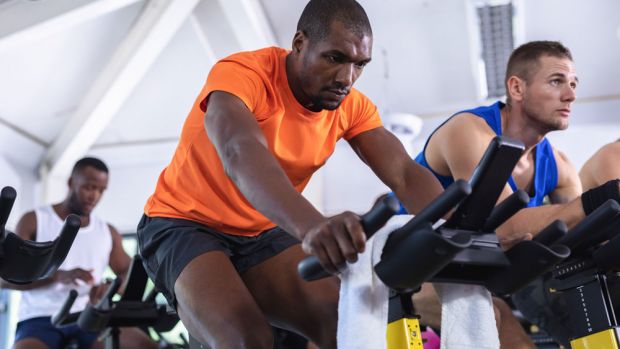
This session lasts around an hour in total (a third of that is rest time, though) and involves rotating between a treadmill, rowing machine and exercise bike.
Round 1
Time 4min Rest 2min Intensity Moderate (5/10)
Start with 4min on the the treadmill, then the rower, then the exercise bike, with 2min breaks in between. After you’ve done all three, take a 3min rest, then move on to round 2.
Round 2
Scale back your effort level for this round. Again hit the treadmill, then the rower, then the bike. Then take a 3min break and move on to round 3.
Round 3
Time 2min Rest 3min Intensity Hard (8/10)
One big last effort on each machine, with plenty of rest.
Progression: Record all the distances you cover in each interval, then try to add small amounts every time you do the workout.
Thursday – Resistance Training 2
Before you start the workout, foam roll your hamstrings, quads, pecs and thoracic spine (your upper and middle back) for 30sec each, to a maximum discomfort level of around 7/10.
1 Alternating active leg lowering
Sets 2 Reps 12 each side Rest 30sec
Lie on your back with both legs straight, resting your heels on a foam roller. Push down with one heel while you raise the opposite leg as high as you can without bending your knee. Return the leg to the start, then swap sides and alternate.
Progression: Add two reps each week until you reach 20 reps.
2 Split kneeling wall arm circle
Sets 1 Reps 5 each arm, each direction Rest 30sec
Kneel next to a wall sideways-on so that there is only a couple of centimetres of space between your shoulder/hip and the wall. Keep your body facing forwards while you attempt to move your arm in a circle without touching the wall. Do five reps forwards and backwards on each arm.
Progression: Add one rep each week until you reach 8 reps.
3 Heel raise deep squat with tensed arms
Sets 1 Reps 12 Rest 30sec
Stand with your feet shoulder-width apart with your heels raised 5cm. Reach your arms straight forwards and clench your fists. Then slowly sit into a deep squat, with your knees open and your chest up. Sit for 2sec, then stand up fully.
Progression: Add two reps each week until you reach 20 reps.
4 Cable Pallof press
Sets 2 Reps 12 each direction Rest 30sec
Stand side on to a cable machine. Select a weight that makes the last few reps of the set are challenging, but doesn’t ruin your form. Hold the handle attachment with both hands, elbows tucked in to the sides of your body. Brace your core, stand tall and maintain soft knees throughout. Press the handle out in front at chest height and resist the pull/rotation towards the machine. Then bring it back in to your chest.
Progression: Add two reps each week until you reach 20 reps.
5 Side step-up
Sets 2 Reps 12 each leg Rest 30sec
Stand side on to a bench, then side-step up onto it. Then step back down again. Do all the reps on one leg, then switch to the other.
Progression: Add two reps each week until you reach 20 reps.
6 Bear crawl and crab walk
Sets 2 Distance 10m Rest 30sec
Start by bear crawling forward, moving your right arm at the same time as your left leg, and vice versa, never letting anything but your feet and hands touch the ground. Then crab walk back by flipping over so your stomach faces the ceiling, keeping your hips raised, and walking on your hands and feet.
Progression: Reduce the rest time by 5sec per week until both sets are performed back-to-back.
7 Cable face pull
Sets 2 Reps 12 Rest 30sec
Use a rope attachment and face a cable machine. Stand tall, holding the attachment in front of you with straight arms, then pull the rope towards your neck/face. Keep your elbows up and out as you pull the rope.
Progression: Add two reps each week until you reach 20 reps.
8 Gym ball kneeling roll-out
Sets 2 Reps 8 Rest 30sec
Kneel in front of a gym ball. Rest your arms on the ball and slowly roll it away from you, keeping your back straight and core braced as you go. Your knees should stay grounded throughout. Extend as far as you can without your hips dropping, then slowly roll back to the starting position.
Progression: Add two reps each week until you reach 16 reps.
9 One-arm overhead press
Sets 2 Reps 12 each side Rest 30sec
Stand with your feet shoulder-width apart, holding a dumbbell in one hand. Choose a weight that is a challenge but that allows you maintain correct form throughout – this move gets tiring very quickly. Hold the dumbbell by your shoulder with your elbow bent at 90°, then press it up straight above your head. Do all the reps on one side, then swap arms.
Progression: Add two reps each week until you reach 20 reps.
10 Jump in place
Sets 2 Reps 8 Rest 30sec
Stand tall with your feet hip-width apart. Sink into a half squat and swing your arms back. Drive upwards into a jump and then stick the landing by pushing your hips back and flexing your knees forward to decelerate the body. Your chest should stay up and your knees should not cave in as you land.
Progression: Add two reps each week until you reach 16 reps.
Saturday – Aerobic Conditioning 2
You get to pick your poison for this 30-minute cardio session – you can run, row, cycle, use a cross-trainer or swim.
Round 1
Time 10min Intensity Easy (3/10)
Use this round as a warm-up.
Round 2
Time 1min Rest 30sec Reps 5 Intensity Hard (8/10)
Rattle through five 1min bursts of hard work, taking 30sec breaks.
Round 3
Time 10min Intensity Easy (3/10)
Warm down.
Progression: Add 10sec to the work intervals in round 2 each week until you end up working for 2min at a time in week 6. The rest periods, unfortunately, do not get any longer.
TrainFitness is a UK personal trainer course provider. For more info visit train.fitness

Nick Harris-Fry is a journalist who has been covering health and fitness since 2015. Nick is an avid runner, covering 70-110km a week, which gives him ample opportunity to test a wide range of running shoes and running gear. He is also the chief tester for fitness trackers and running watches, treadmills and exercise bikes, and workout headphones.
